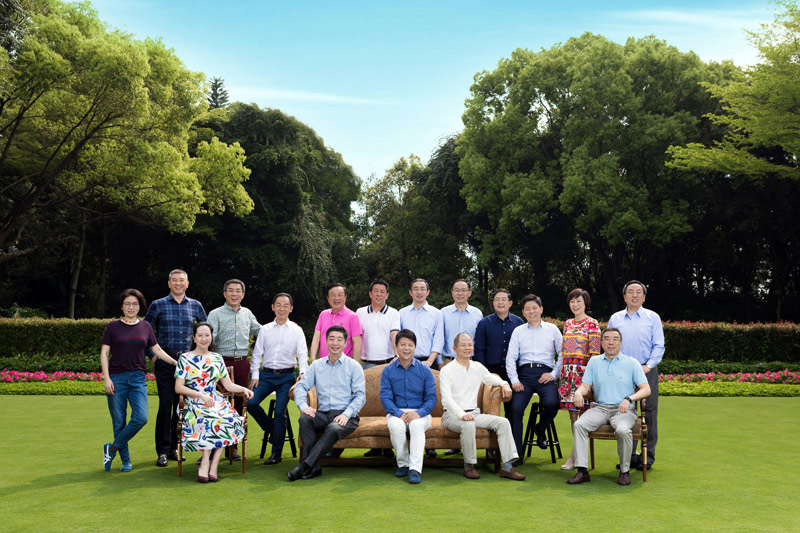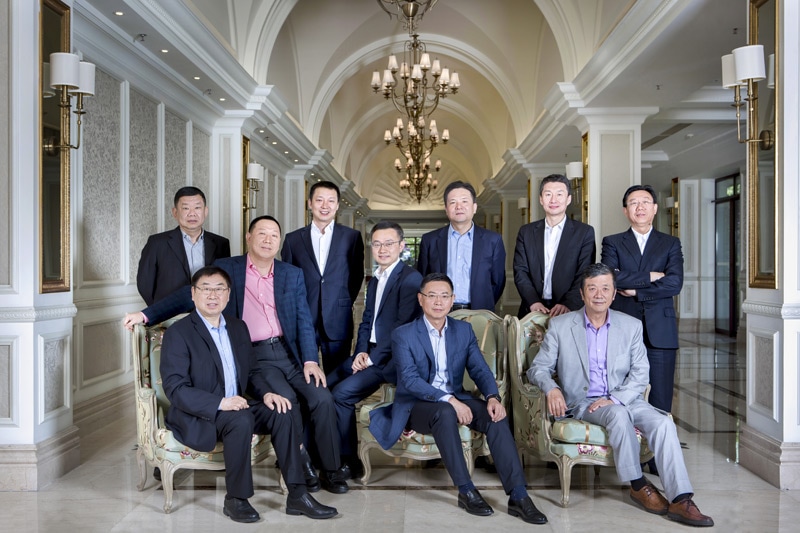Kurumsal Yönetim
By staying customer-centric and inspiring dedication, we have sustained long-term growth through continuous improvement of our corporate governance structure, organizations, processes, and appraisal systems.

(As of December 31, 2017)
The Shareholders’ Meeting is the company’s authoritative body, making decisions on making decisions on major issues such as the company's capital increase, profit distribution, and selection of the members of the Board of Directors/Supervisory Board.
The Board of Directors (BOD) is the highest body responsible for corporate strategy, operations management, and customer satisfaction. The BOD’s mission is to lead the company forward. It exercises decision-making authority for corporate strategy and operations management, and ensures the protection of customer and shareholder interests.
The BOD and its Executive Committee will be led by rotating chairmen. During their terms, the rotating chairmen will serve as the foremost leader of the company.
The key responsibilities of the Supervisory Board include overseeing the responsibility fulfillment of BOD members and senior management, monitoring the company’s operational and financial status, and supervising internal control and legal compliance.
KPMG has been Huawei's independent auditor since 2000. The independent auditor is responsible for auditing a company's annual financial statements. In accordance with applicable accounting standards and audit procedures, the independent auditor expresses an opinion as to whether the financial statements are true and fair.
The company has established a business structure that focuses on three dimensions: customers, products, and regions. All organizations jointly create value for customers, and are responsible for the company’s financial results, market competitiveness, and customer satisfaction.
- The Carrier BG and the Enterprise BG manage and support solution marketing, sales, and services that target carrier customers and enterprise/industry customers respectively. The two BGs provide innovative, differentiated, and advanced solutions based on the business characteristics and operational patterns of different customers while continuously improving the company’s industry competitiveness and customer satisfaction. The Consumer BG focuses on serving device consumers and deals with all aspects of the consumer domain. This BG is responsible for business performance, risk controls, market competitiveness, and customer satisfaction in the consumer business.
- In 2017, Huawei established the Cloud BU, a business unit responsible for end-to-end management of Huawei’s offering in the cloud services industry. It is tasked with enhancing competitiveness in cloud services, and ensuring customer satisfaction and business success in this domain.
- Products & Solutions is an organization that provides integrated ICT solutions to carriers and enterprise/industry customers. In addition to product planning, development, and delivery, this organization is also responsible for developing product competitiveness in order to deliver a better user experience and support the company’s business success.
- Regional organizations are the company’s regional operations centers. They are responsible for developing and effectively leveraging regional resources and capabilities, and also for the execution of corporate strategy in their regions. The company has continuously optimized regional organizations and accelerated the delegation of authority to field offices. Command and on-site decision making authority has gradually been delegated to representative offices. Currently, to improve efficiency and responsiveness to customer needs, the company is piloting contract approval at the representative office level in some countries. While establishing closer partnerships with customers and helping them achieve business success, regional organizations will continue to support the company in achieving profitable and sustainable growth.
- Group Functions provide business support, services, and supervision. They are positioned to offer accurate, timely, and effective services to field offices and strengthen supervision while delegating sufficient authority to them.
About the Board of Directors
The Board of Directors (BOD) is the highest body responsible for corporate strategy, operations management, and customer satisfaction. The BOD’s mission is to lead the company forward. It exercises decision-making authority for corporate strategy and operations management, and ensures the protection of customer and shareholder interests.
The main responsibilities of the BOD are to:
- Develop proposals for corporate governance.
- Review proposals to increase or decrease the company’s registered capital, as well as proposals related to profit distribution and loss recovery.
- Review the company’s stock options plan and other long-term incentive plans.
- Review or approve plans for entering and exiting different industry sectors, and approve the company’s strategic plan.
- Approve proposals for managing major risks and crises, and manage major emergencies.
- Approve major organizational restructuring, management system development, and business transformation.
- Approve major financial policies, financial plans, and business transactions.
- Approve the company’s annual budget proposal, annual operations report, and annual audit report.
- Approve the development of internal controls and operational compliance systems.
- Approve the appointment/removal, compensation, and long-term incentives of senior management.
- Approve major HR policies and plans at the corporate level.

Currently, the BOD is comprised of 17 members, who were elected by the Representatives’ Commission and voted in by the Shareholders’ Meeting. In 2017, several board members resigned from the board, and membership was adjusted accordingly. In March 2018, the Representatives’ Commission and Shareholders’ Meeting elected a new Board of Directors that includes both regular members and alternate members. In the event that there is a vacancy in the BOD, alternate members will take up the vacancy in a predetermined sequence.
Current board members include:
- Chairman: Mr. Liang Hua
- Deputy Chairs: Mr. Guo Ping, Mr. Xu Zhijun, Mr. Hu Houkun, and Ms. Meng Wanzhou
- Executive Directors: Mr. Ding Yun, Mr. Yu Chengdong, and Mr. Wang Tao
- Directors: Mr. Xu Wenwei, Ms. Chen Lifang, Mr. Peng Zhongyang, Ms. He Tingbo, Mr. Li Yingtao, Mr. Ren Zhengfei, Mr. Yao Fuhai, Mr. Tao Jingwen, and Mr. Yan Lida
Alternate Directors include: Mr. Li Jianguo, Mr. Peng Bo, and Mr. Zhao Ming
Operations of the Board of Directors
In 2017, the BOD held 12 meetings. At the meetings, the BOD reviewed and approved matters such as the company’s medium-to-long-term development plan, annual business plan and budget, annual audit report, corporate governance rules and regulations, BOD committee operations, long-term incentives, annual profit distribution, capital increases, and financing.
The BOD has established the Executive Committee, which acts as the standing executive body of the BOD. Entrusted by the BOD, the Executive Committee examines and reflects on major issues within the company, decides on issues authorized by the BOD, and oversees their execution. In 2017, the Executive Committee held 12 meetings.
Members of the BOD Executive Committee include Mr. Guo Ping, Mr. Xu Zhijun, Mr. Hu Houkun, Ms. Meng Wanzhou, Mr. Ding Yun, Mr. Yu Chengdong, and Mr. Wang Tao.
In the future, the BOD and its Executive Committee will be led by rotating chairmen. During their terms, the rotating chairmen will serve as the foremost leader of the company. Rotating chairmen terms last six months at a time. The rotation schedule for the next five years is as follows:
Mr. Xu Zhijun:
April 1, 2018 to September 30, 2018
October 1, 2019 to March 31, 2020
April 1, 2021 to September 30, 2021
October 1, 2022 to March 31, 2023
Mr. Guo Ping:
October 1, 2018 to March 31, 2019
April 1, 2020 to September 30, 2020
October 1, 2021 to March 31, 2022
Mr. Hu Houkun:
April 1, 2019 to September 30, 2019
October 1, 2020 to March 31, 2021
April 1, 2022 to September 30, 2022
About the Supervisory Board
Pursuant to the requirements of the Company Law of the People’s Republic of China, Huawei has established the Supervisory Board. The key responsibilities of the Supervisory Board include overseeing the responsibility fulfillment of BOD members and senior management, monitoring the company’s operational and financial status, and supervising internal control and legal compliance. Members of the Supervisory Board attend BOD and EMT meetings as non-voting participants.

The Supervisory Board is comprised of 10 members, who were elected by the Representatives’ Commission and voted in by the Shareholders’ Meeting. In 2017, several members of the Supervisory Board resigned from the board, and membership was adjusted accordingly. In March 2018, the Representatives’ Commission and Shareholders’ Meeting held a by-election for members of the Supervisory Board.
Current Supervisory Board members include:
- Chairman: Mr. Li Jie.
- Executive members: Mr. Zhou Daiqi, Mr. Ren Shulu, Mr. Yin Xuquan, Mr. Li Jin’ge, and Mr. Li Dafeng.
- Members: Mr. Song Liuping, Mr. Tian Feng, Mr. Yi Xiang, and Mr. Li Jian.
Operations of the Supervisory Board
The Supervisory Board held five meetings in 2017. At the meetings, it assessed the responsibility fulfillment of the members of the BOD and Supervisory Board in 2016, examined and evaluated the company’s financial status, and received reports on management of top legal risks and supervision of overseas subsidiaries. Throughout the year, members of the Supervisory Board attended 12 meetings of the BOD as non-voting participants, overseeing the legitimacy of BOD decisions and operations.
The Supervisory Board has established the Executive Committee, which acts as authorized by the Supervisory Board. Members of the Executive Committee are Mr. Li Jie, Mr. Zhou Daiqi, Mr. Ren Shulu, Mr. Yin Xuquan, Mr. Li Jin’ge, and Mr. Li Dafeng.
An independent auditor is responsible for auditing a company's annual financial statements. In accordance with applicable accounting standards and audit procedures, the independent auditor expresses an opinion as to whether the financial statements are true and fair.
The scope of the financial audit and the annual audit results are subject to review by the Audit Committee. Any relationship or service that may potentially affect the objectivity and independence of the independent auditor can be discussed with the Audit Committee. The independent auditor may discuss any issues identified or any difficulties encountered during the course of the financial audits with the Audit Committee.
KPMG has been Huawei's independent auditor since 2000.
Huawei continued to design and implement an internal control system based on its organizational structure and operating model. The internal control framework and its management system apply to all business and financial processes of the company and its subsidiaries and business units. The internal control system is based on the five components of the COSO framework: Control Environment, Risk Assessment, Control Activities, Information & Communication, and Monitoring. It also covers internal controls of financial statements to ensure their truthfulness, integrity, and accuracy.
Control Environment
A control environment is the foundation of an internal control system. Huawei is committed to a corporate culture of integrity, business ethics, and compliance with laws and regulations. Huawei has issued the BCGs to identify acceptable business conduct. The BCGs must be observed by all employees, including senior executives. Regular training programs are offered, and all employees are requested to sign the BCGs to ensure that the BCGs have been read, understood, and observed.
Huawei has implemented a mature governance structure, with clearly defined authorization and accountability mechanisms. The governance structure comprises the BOD, its committees, group functions, and multi-level management teams.
Huawei clearly defines the roles and responsibilities of its organizations to ensure the effective separation of rights and responsibilities. The CFO of Huawei is in charge of internal controls. The business control department reports to the CFO for any possible defects and improvements already made in terms of internal controls, and assists the CFO in building the internal control environment. The internal audit department independently monitors and assesses the status of internal controls for all business operations.
Risk Assessment
Huawei has a department dedicated to internal controls and risk management to regularly assess risks to the company's global business processes. This department identifies, manages, and monitors significant risks, forecasts potential risks caused by changes to the internal and external environments, and submits risk management strategies along with risk mitigation measures for decision-making. All process owners are responsible for identifying, assessing, and managing business risks and taking necessary internal control measures. Huawei has instituted a mechanism for improving internal controls and risk controls to efficiently manage critical risks.
Control Activities
Huawei has established the Global Process Management System and the Business Transformation Management System, released the global BPA, and appointed GPOs in line with the BPA. Responsible for building processes and internal controls, GPOs:
- Identify key control points and the Separation of Duties Matrix for each process, and apply these to all regional offices, subsidiaries, and business units.
- Conduct monthly compliance tests on key control points and issue test reports to ensure continuous and effective monitoring of internal controls.
- Optimize processes and internal controls based on business pain points and key requirements for financial statements. The aim is to improve operating efficiency and financial results, ensure operational compliance and the accuracy and reliability of financial statements, and help achieve business objectives.
- Perform SACAs to assess the overall process design and the effectiveness of process execution by each business unit, and then report the results to the AC.
Information & Communication
Huawei has developed multi-dimensional information and communication channels to ensure the timely acquisition of external information from customers, suppliers, and other parties. It has also created formal channels for transferring internal information, and offered an online space, Xinsheng Community, for employees to freely communicate their thoughts and ideas. Corporate management holds regular meetings with departments at all levels to effectively communicate management orientation to employees and ensure effective implementation of management decisions.
All business policies and processes are available on the company's Intranet. Managers and process owners regularly organize training programs on business processes and internal controls to ensure that up-to-date information is made available to all employees. The company has established a mechanism for process owners at all levels to regularly communicate with each other, review the execution of internal controls, and follow up on internal control issues.
Monitoring
Huawei has established an internal complaint channel, an investigation mechanism, an anti-corruption mechanism, and an accountability system. The Agreement on Honesty and Integrity that Huawei has signed with its suppliers clearly stipulates that suppliers may report improper conduct by Huawei employees through the channels stipulated in the Agreement to assist the company in monitoring the integrity of its employees. The internal audit department independently assesses the overall status of the company's internal controls, investigates any suspected violations of the BCGs, and reports the audit and investigation results to the AC and senior management.
Huawei has also implemented a mechanism for internal control appraisals of GPOs and regional managers, as well as their accountability and impeachment when and where necessary. The AC and the CFO regularly review the company's internal control status, and receive reports on action plans for improving internal controls, if necessary, and on plan execution progress. Both have the authority to request the relevant GPOs or business executives to explain their internal control issues and take corrective actions. The AC and the CFO may also need to submit their proposals to the HRC for disciplinary action or impeachment.


